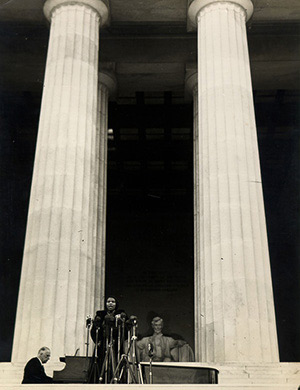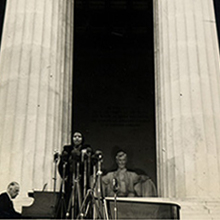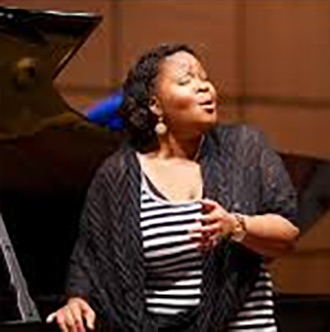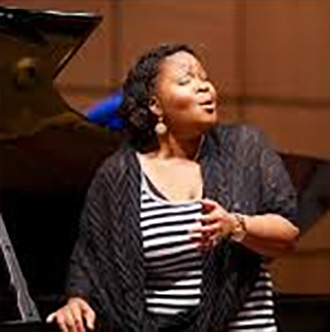
To honor the career of African American Philadelphia-born musician and cultural ambassador, Marian Anderson (1897-1993), the Kislak Center and the Departments of Music and Africana Studies have organized a one-day symposium to explore Anderson's musical career in the context of the intersection of sound studies and critical race theory. Confirmed speakers include Naomi Andre, Kira Thurman, Carol Oja, Ellie Hisama, Alisha Jones, Salamishah Tillet, and Guy Ramsey. An interview with Florence Quivar will precede the concluding musical recital by Karen Slack celebrating Anderson's remarkable musical career. An exhibition of items from Penn Libraries vast Marian Anderson archival collection will be on view during the symposium.
We gratefully acknowledge the generous support of several Penn entities who make this event possible: the Thomas Sovereign Gates Fund, the Eugene Ormandy Library Fund, the Kislak Center for Special Collections, the Center for Africana Studies, the Department of Africana Studies, the Department of Music, the Center for Italian Studies, the Alice Paul Center for Research on Gender, Sexuality, and Women, the University Research Foundation, and the School of Arts and Sciences.

Marian Anderson's position in the world of opera is pivotal in the way she brought attention to black singers in opera through her historic debut at the Metropolitan Opera in 1955. Yet as many know, this was not her first, or last, important accomplishment. Besides a successful tour of Europe in the early 1930s, she made world-wide news in 1939 when she sang on the steps of the Lincoln Memorial, and she became an iconic figure of the Civil Rights movement. She sang for two Presidential inaugurations (Eisenhower in 1957 and Kennedy in 1961) and performed at the 1963 March on Washington for Jobs and Freedom where Martin Luther King, Jr. delivered his "I have a Dream" speech. Despite the private nature of her personality, Anderson's place in American culture was in between art and politics, opera and spirituals, concert singer and artistic ambassador. Anderson's career also holds a special place in between the legendary black singers who came before her (including Elizabeth Taylor Greenfield, Sissieretta Jones, Marie Selika, Flora Batson) and the generations who have enjoyed operatic careers since (including Leontyne Price, Shirley Verrett, Grace Bumbry, Kathleen Battle, Denyce Graves, and Angel Blue).
An underexplored legacy of Marian Anderson is the way an "in-betweenness" is embodied in so many aspects of her voice, career, and place in society. Sometimes it is found in the difficulty of putting a black operatic voice into one neat category (the singers who move between standard repertory roles, including those whose voices are called Zwischenfach). Sometimes it is presented in the uncanny backgrounds of singers who were school teachers, football players, violent youth sentenced to juvenile detention facilities, or beauty queens before finding their place on the opera stage. From the past up through today, there is no standard way to be a black opera singer; the "in between" characterization that was embedded in Anderson's career frequently remains a defining element for black opera singers today.
Naomi André, Associate Professor, Department of Afroamerican and African Studies, Women's Studies, Associate Director of Faculty, Residential College of the University of Michigan. Black Opera: History, Power, Engagement (2018), Voicing Gender: Castrati, Travesti, and the Second Woman in Early Nineteenth-Century Italian Opera (2006) and co-editor of Blackness in Opera (2012).
In this presentation, I argue that perception of timbre is shaped through narratives about the singer and the voice—specifically, by which artistic, genre, repertoire, ethnic, or racial genealogies are drawn around the singer. By arranging the narrative arc within which a voice is heard, perceptions can be radically directed, opportunities presented for the singers can open and close, and the artist's voice and career can be shaped. For example, applying such a reading, we see that Marian Anderson was placed within the narrative genealogy constituted by the historical perception of slaves' voices, burlesque opera, and minstrel shows. Her career, her voice, and its perception were thus shaped by such complex filters and identity markers, including the notions of black voice and the suffering voice of the spiritual, that became so strongly associated with her that she was not allowed to move beyond their projection onto her voice. With Anderson as a focal point, this talk traces the fraught history of African-American singers in integrated U.S. opera to the mid-nineteenth and early-twentieth centuries.
Nina Eidsheim, Professor of Musicology, UCLA; Special Assistant to the Dean of the School of Music. Sensing Sound: Singing and Listening as Vibrational Practice (Duke, 2015) and The Race of Sound: Listening, Timbre, and Vocality in African American Music (Duke, 2019); co-editing Oxford Handbook of Voice Studies(forthcoming).
The white baritone Oscar Seagle's conclusion of a 1917 concert in Brooklyn with five of Harry T. Burleigh's spiritual arrangements was, as Jean Snyder notes, one of the earliest concerts at which white performers sang spirituals in recitals. While some white singers embraced Burleigh's arrangements and followed Seagle's initiative at the close of their recitals, others rejected the practice after discovering that Burleigh was African American. While these singers deemed Burleigh's arrangements to be musically worthy, their racism kept his music out of the recital hall and away from their performing bodies.
The Daughters of the American Revolution's refusal in 1939 to allow Marian Anderson to perform in Constitution Hall because she was African American likewise aimed to keep a black artist out of a traditionally white space. When the performance ultimately took place at the Lincoln Memorial, not only was the stage occupied by an African American performer, but the music of African American composers was also honored that day with Anderson's decision to close her performance with the arrangements "Gospel Train" by Burleigh, "Trampin'" by Edward Boatner, and "My Soul's Been Anchored in de Lord" by Florence B. Price.
In her 1962 essay, "What Spirituals Mean to Me," Anderson writes: "Spirituals, begun in slavery, still have much to say to us. They have always been songs from the heart and soul. And more and more, in a larger, more frightening world, we must learn to speak from one soul to another." This paper considers Marian Anderson's cultural activism with regard to her performance of spiritual settings by African American composers, attending to her recordings of two works. Drawing on materials held at the University of Pennsylvania's Rare Books and Manuscript Library, I argue that Anderson's quiet activism, manifest in her embrace of music by African American composers and inclusion in her repertory, is also embedded in her interpretation of Burleigh's "Deep River" and Price's "My Soul's Been Anchored in de Lord."
Ellie Hisama is Professor of Music at Columbia University, the author of Gendering Musical Modernism, and past editor of Women and Music. She co-directs Working in Sound: For the Daughters of Harlem, a multi-year project for New York public school students to engage with music as performers, sound artists, and thinkers.
…only the BLACK WOMAN can say when and where I enter, in the quiet, undisputed dignity of my womanhood, without violence and without suing or special patronage, then and there the whole Negro race enters with me.
Anna Julia Cooper from A Voice from the South (1882)
"When will we listen to black women?" was the rallying cry echoed throughout the streets, in journalistic think pieces, and on social media in 2017. These reactions followed the polling results revealing black women's collective voting power in arguably the most contentious elections in the twenty first century, thus far. In an era of black women-founded movements such as #BlackLivesMatter, #MeToo, and #SayHerName, some use messianic language to characterize them as "saving the day," despite being marginalized in various predominantly white women's movements. Thought-leaders are noticing the socio-political inaudibility of black women liberators highlighting the bias woven into the fabric of the U.S. popular imagination.
However, this socio-political observation does not account for black women's agency and ingenuity in creating spaces for themselves in musical performance and quotidian life throughout history. Prompted by activist Anna Julia Cooper's famous quote as a womanist ethnomusicological framework of utterance (say/sing), time (when), space (where) and access (enter), this presentation constructs a genealogy of black women's audibility strategies by answering the question: In what ways have black women empowered themselves to sound the (un)quieted, undisputed dignity of womanhood on the world's stage?
Despite black women's persistent socio-political inaudibility, especially in U.S. women's suffrage movements, contralto Marian Anderson's narrative reveals a longstanding legacy of black women embodying and amplifying black women composed works as evidenced by her 1939 recital at the Lincoln Memorial in Washington, DC. Although she was refused concert space at the Daughters of the American Revolution Constitution Hall in DC, Anderson accepted first lady Eleanor Roosevelt's invitation to sing at the Lincoln memorial. During that recital, Anderson displayed Black sisterhood and challenged the parameters of women's suffrage when she closed the concert with an arranged-composition of the Negro Spiritual "My Soul's Been Anchored in the Lord" by black woman composer Florence B. Price. As Anderson envoiced Price's composition as the "final say" on the moment, she provided a musical rebuttal through which both Anderson and Price entered into the concert domains predominantly comprised of white male decision makers, an exclusionist industry bolstered by unsisterly white women patrons.
Alisha Lola Jones, Assistant Professor, Department of Folklore and Ethnomusicology, Indiana University, Bloomington. AMS and SEM council member; SEM liaison to American Academy of Religion. Forthcoming book Flaming: The Peculiar Theo-Politics of Fire and Desire in Black Male Gospel Performance breaks ground by analyzing the role of gospel music making in constructing and renegotiating gender identity among black men.
Marian Anderson's debut at the Metropolitan Opera House in January 1955 marked a milestone in both her career and the Met's history. That debut carried tremendous weight historically, politically, and racially, as it broke through the opera company's longstanding Jim Crow practices. It occurred belatedly on both sides: Anderson was about to turn 58, and the Met was 75. Furthermore, it is underreported in histories of the institution—noted in passing, if at all—and it is consistently conveyed with a celebratory tone.
This paper revisits the archive to construct parallel histories of the Met's segregationist practices and the incremental steps towards desegregation that yielded Anderson's premiere. The time span reaches back to 1925, when Anderson made her debut with the New York Philharmonic's summertime Stadium Concerts—a thoroughly improbable event within racial practices of its day. Yet Anderson's appearance in a prestigious and thoroughly white setting opened a space in which New York City's major institutions of classical music could begin to imagine mixed-race performance. As Anderson once said, "A number of my people get a great deal more out of actually seeing a person, than they do by hearing about the artist, or hearing a performance on the radio. Seeing a person … some of them can be inspired." She made that statement in relation to the impact on African Americans of her performances in the deep South; but when flipped, it also can apply to white concert presenters in the North.
Walter White, executive director of NAACP, and Sol Hurok, Anderson's manager beginning in 1935, led a campaign for Anderson to gain equal access to concert halls and major performance institutions. Landmarks included triumph over segregated seating practices in Florida in 1952 and a major victory with Constitution Hall in Washington D.C. in 1953, when Anderson performed on her own terms. One cunning strategy was to rent the Metropolitan Opera House for an annual concert by Anderson, a practice that she and Hurok began in April 1943. By doing so she occupied the space.
Carol J. Oja is William Powell Mason Professor of Music at Harvard University. Her most recent book is Bernstein Meets Broadway: Collaborative Art in a Time of War, and she is currently at work on a book about Marian Anderson and the racial desegregation of classical music performance.
This paper considers the legacy of Marian Anderson's diva status in relationship to those of the late soul singer Aretha Franklin and hip hop artist Lauryn Hill. The latter have been labeled geniuses and as path breaking artists whose careers are emblematic in soul music and hip-hop respectively. As black virtuoso women, the contingencies of history, genre and gender impinged on Hill's and Franklin's artistic choices and limitations in ways that this paper identifies. How had the designation "black diva" changed after Marian Anderson's reign?
Guthrie P. Ramsey, Jr. is Edmund J. & Louise W. Kahn Term Professor of Music, University of Pennsylvania. Race Music: Black Cultures from Bebop to Hip-Hop; The Amazing Bud Powell: Black Genius, Jazz History and the Challenge of Bebop; with Samuel Floyd, Melanie Zeck, The Transformation of Black Music: The Rhythms, the Songs and the Ships of the African Diaspora.
Between 1930 and 1937, an enormous and loyal fanbase had developed in Germany and Austria around one woman: contralto Marian Anderson, who frequently came to Central Europe to study and perform. Her legendary concert at the Salzburg Festival in Austria in 1935 made her an international superstar overnight. There, famed conductor Arturo Toscanini said that Anderson had a voice "heard once in a hundred years." By November 1937, with the Nazis firmly planted in Germany and encroaching on Austria, Marian Anderson offered one last and final concert in Vienna, Austria that quickly sold out. After her concert, a journalist wailed that the city had lost a symbol of hope and light during a time of increasing darkness.
What was it about Marian Anderson that drew such an overwhelming response in Central Europe during one of its most turbulent eras of nationalism and racism? How did they understand her performances? In this presentation, I analyze Marian Anderson's reception in Central Europe and investigate the powerful Central European patrons and networks that backed her. Audiences, patrons, and friends, I argue, understood her performances of Schubert and Brahms as performances of black womanhood and championed them as such. Under the shadow of Nazism in Central Europe, Anderson's performances, heard in a racial key, were symbols of musical universalism.
Kira Thurman, Assistant Professor, German and History, University of Michigan, Ann Arbor. Research on race, music, and national identity in Central Europe has appeared in German Studies Review, Journal of World History, Opera Quarterly, and Journal of the American Musicological Society (JAMS). Her book-in-progress is entitled Singing like Germans: Black Musicians in the Land of Bach, Beethoven, and Brahms.
On the liner notes for Nina Simone's 1959 debut album "Little Girl Blue," music writer Joseph Muranyi described Simone's arresting voice as "a vibrant and husky contralto that tonally sounds like a blend of an unlikely combination of Marian Anderson and Ma Rainey." Unknown to Muranyi, Anderson had long been an inspiration for young Nina, born Eunice Waymon, as she grew up in the segregated South as a prodigious classical musician. Exploring lineage as a one of feminist politics and intellectual kinship rather than an anxiety of influence or artistic competition, this essay will explore how Simone actively invoked Anderson's musical biography, repertoire, and iconicity as model for her own development within American popular music and civil rights activism.
Salamishah Tillet, Associate Director, Clement A. Price Institute; Professor, African American and African Studies, Rutgers University. Sites of Slavery: Citizenship and Racial Democracy in the Post-Civil Rights Imagination (2012). Publications include those in American Literary History, American Quarterly, Callaloo, Novel, Research in African Literatures. Currently at work on a book on Nina Simone.

Please join us for an evening celebrating Anderson's remarkable musical career. A pre-concert interview featuring Florence Quivar, legendary Phila-native singer and current faculty at the prestigious Academy of Vocal Arts, and Michael Bolton (Opera Philadelphia) as they remember Ms. Anderson and consider her impact. The evening concert will feature another Philadelphia-native singer, soprano Karen Slack, who will offer a solo program inspired by the legacy of Ms. Anderson of art songs, operatic arias, and African-American spirituals. Ms. Slack will be accompanied by Yu Xi Wang on piano.
This concert is part of the Sound, Gender, and the Color Line series of coordinated events, featuring an academic symposium, school outreach, and lecture. The concert and related activities are made possible by the support of the Thomas Sovereign Gates Fund, the Eugene Ormandy Library Fund, the Kislak Center for Special Collections, the Center for Africana Studies, the Department of Africana Studies, the Department of Music, the Center for Italian Studies, the Alice Paul Center for Research on Gender, Sexuality, and Women, the University Research Foundation, and the School of Arts and Sciences.

Friday, October 26
9:00-9:10 am: Larry Bernstein, Welcoming Remarks
Morning session
Chair: Glenda Goodman
9:10-9:50 am: Naomi André (University of Michigan)
9:50-10:30 am:Nina Eidsheim (UCLA)
10:30-10:40 am: Session break
10:45-11:25 am: Carol J. Oja (Harvard University)
11:25-12:05 pm: Alisha Jones (Indiana University)
12:05-2:00 pm: Lunch (on your own)
Afternoon Session
Chair: Tim Rommen
2:00-2:40 pm: Guthrie P. Ramsey, Jr. (University of Pennsylvania)
2:40-3:20 pm: Kira Thurman (University of Michigan)
2:40-3:20 pm: Kira Thurman (University of Michigan)
3:35-4:15 pm: Session break
2:40-3:20 pm: Ellie M. Hisama (Columbia University)
4:15-4:55 pm: Salamishah Tillet (Rutgers University)
4:55-5:00 pm: Closing remarks
Evening Events
6:45 pm: Ms. Florence Quivar, legendary Phila-native singer and current faculty at the prestigious Academy of Vocal Arts, will be interviewed by Mr. Michael Bolton, Opera Philadelphia's VP of Community Initiatives.
8:00 pm: Concert featuring another Philadelphia-native singer, soprano Karen Slack, who will offer a solo program inspired by the legacy of Ms. Anderson.